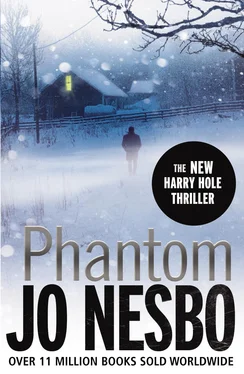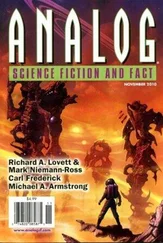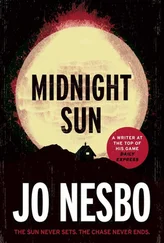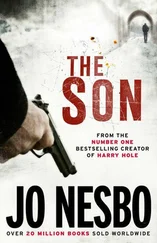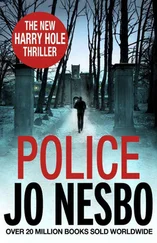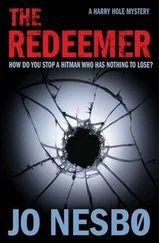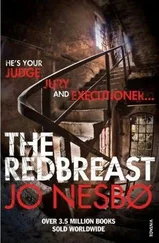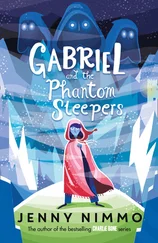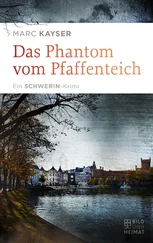Jo Nesbo - Phantom
Здесь есть возможность читать онлайн «Jo Nesbo - Phantom» весь текст электронной книги совершенно бесплатно (целиком полную версию без сокращений). В некоторых случаях можно слушать аудио, скачать через торрент в формате fb2 и присутствует краткое содержание. Жанр: Триллер, на английском языке. Описание произведения, (предисловие) а так же отзывы посетителей доступны на портале библиотеки ЛибКат.
- Название:Phantom
- Автор:
- Жанр:
- Год:неизвестен
- ISBN:нет данных
- Рейтинг книги:4 / 5. Голосов: 2
-
Избранное:Добавить в избранное
- Отзывы:
-
Ваша оценка:
- 80
- 1
- 2
- 3
- 4
- 5
Phantom: краткое содержание, описание и аннотация
Предлагаем к чтению аннотацию, описание, краткое содержание или предисловие (зависит от того, что написал сам автор книги «Phantom»). Если вы не нашли необходимую информацию о книге — напишите в комментариях, мы постараемся отыскать её.
Phantom — читать онлайн бесплатно полную книгу (весь текст) целиком
Ниже представлен текст книги, разбитый по страницам. Система сохранения места последней прочитанной страницы, позволяет с удобством читать онлайн бесплатно книгу «Phantom», без необходимости каждый раз заново искать на чём Вы остановились. Поставьте закладку, и сможете в любой момент перейти на страницу, на которой закончили чтение.
Интервал:
Закладка:
The first thing Harry did when he got into the rental car was to check his mobile phone. He saw one missed call from Beate Lonn, but still nothing from Isabelle Skoyen. By Ulleval Stadium Harry realised he had timed his journey out of town badly. The nation with the shortest working hours was on its way home. It took him fifty minutes to reach Karihaugen.
Sergey was sitting in his car drumming his fingers on the wheel. In theory, his workplace was situated on the right side of rush-hour traffic, but when he was on the evening shift he ended up stuck in the gridlock leaving town anyway. The cars edged towards Karihaugen like cooling lava. He had googled the policeman. Clicked on old news stories. Murder cases. He had taken out a serial killer in Australia. Sergey had noticed that because the same morning he had been watching a programme from Australia on Animal Planet. It was all about the intelligence of crocodiles in the Northern Territory, about how they learned the habits of their prey. When men camped in the bush they usually took a path along a billabong to collect water after waking in the morning. On the path they were safe from crocodiles lying in the water and watching. If they stayed a second night the same would be repeated the next day. If they stayed a third night they would walk along the path once more, but this time they wouldn’t see a crocodile. Not until it rushed out of the bush and dragged its prey into the water.
The policeman had seemed ill at ease in the pictures on the Net. As though he didn’t like being photographed. Or watched.
The phone rang. It was Andrey. He got straight to the point.
‘He’s staying at Hotel Leon.’
The south Siberian dialect was in fact like a machine gun, staccato, but Andrey made it sound soft and flowing. He said the address twice, slowly and clearly, and Sergey memorised it.
‘Good,’ he said, trying to sound keen. ‘I’ll ask for his room number. And unless it’s at the end of a corridor I’ll wait there, at the end. So that when he leaves his room for the stairs or the lift he’ll have to turn his back on me.’
‘No, Sergey.’
‘No?’
‘Not in the hotel. He’ll be ready for us at Leon.’
Sergey started with surprise. ‘Ready?’
He changed lane and slipped in behind a rental car as Andrey explained that the policeman had contacted two sellers and invited ataman to Hotel Leon. It stank of a trap from some distance. Ataman had given clear orders that Sergey was to do the job somewhere else.
‘Where?’
‘Wait for him in the street outside the hotel.’
‘But where shall I do it?’
‘You can choose,’ Andrey said. ‘But my personal favourite is an ambush.’
‘Ambush?’
‘Always an ambush, Sergey. And one more thing…’
‘Yes?’
‘He’s beginning to advance into areas where we don’t want him to advance. That means this is becoming a matter of urgency.’
‘What… does that mean?’
‘ Ataman says you should take whatever time you need, but no more. Today is better than tomorrow. Which is better than the day after. Understand?’
When they rang off Sergey was still in the traffic jam. He had never felt so alone in all his life.
Rush hour was at its peak, and the tailback did not lighten until Berger, just before the Skedsmo intersection. By then Harry had been sitting in the car for an hour and had scanned all the radio channels before ending up with NRK Classical out of sheer protest. Twenty minutes later he saw the turn-off to Gardermoen. He had rung Tord Schultz’s number a dozen times during the day without getting through. Schultz’s colleague, whom he eventually located at the airline, said he had no idea where Tord could be and that he generally stayed at home when he wasn’t flying. And confirmed the address Harry had found on the Net.
Darkness was falling when Harry inferred from the road sign that he was in the right place. He drove slowly between the identical shoeboxes on either side of the newly asphalted road. From the houses which were illuminated enough for him to be able to read the numbers he worked out which was Tord Schultz’s. It lay in total darkness.
Harry parked the car. Looked up. Silver came out of the black sky, a plane, as soundless as a bird of prey. Lights swept across rooftops, and the plane disappeared behind him carrying the noise after it like a bridal train.
Harry walked up to the front door, placed his face against the glass panel and rang. Waited. Rang again. Waited for a minute.
Then he kicked in the panel.
He passed his hand through, found the latch and opened the door.
Stepping over the shards of glass, he continued into the living room.
The first thing that struck him was the darkness, that it was darker than a room should be, even unlit. He realised that the curtains were drawn. Thick blackout curtains of the kind they used at the military camp in Finnmark to keep out the midnight sun.
The second thing that struck him was the sense that he was not alone. And since Harry’s experience was that such feelings were almost always accompanied by quite tangible sensory impressions he concentrated on what they could be, and repressed his own natural reaction: a faster pulse rate and the need to go back the same way he had come. He listened, but all he could hear was a clock ticking somewhere, probably in an adjacent room. He sniffed. A pungent, stale smell, but there was something else, distant, but familiar. He closed his eyes. As a rule he could see them before they came. Over the years he had developed coping strategies to ward them off. But now they were on him before he could bolt the door. The ghosts. It smelt of a crime scene.
He opened his eyes and was dazzled. The light. It swept across the living-room floor. Then came the sound of the plane, and in the next second the room was plunged into darkness again. But he had seen. And it was no longer possible to repress the faster pulse and the urge to get out.
It was the Beetle. Zjuk. It hovered in the air in front of his face.
21
The face was a mess.
Harry had switched on the living-room light and was looking down at the dead man.
His right ear had been nailed to the parquet floor and his face displayed six black, bloody craters. He didn’t need to search for the murder weapon: it hung at head height right in front of him. At the end of a rope suspended from a beam was a brick. From the brick protruded six blood-covered nails.
Harry crouched down and stretched out his hand. The man was cold, and rigor mortis had definitely set in, despite the heat of the room. The same applied to livor mortis; the combination of gravity and the absence of blood pressure had allowed the blood to settle at the body’s lowest points and lent the underside of the arms a slightly reddish colour. The man had been dead for more then twelve hours, Harry guessed. The white, ironed shirt had rucked up and some of the stomach could be seen. It did not yet have the green hue which showed that bacteria had started to consume him, a feast which generally started after forty-eight hours and spread outwards from the stomach.
In addition to the shirt, he was wearing a tie, which had been loosened, black suit trousers and polished shoes. As though he had come straight from a funeral or a job with a dress code, Harry thought.
He took out his phone and wondered whether to ring the Ops Room or Crime Squad directly. He tapped in the number for the Ops Room while looking around. He hadn’t noticed any signs of a break-in, and there was no evidence of a struggle in this room. Apart from the brick and the corpse there was no evidence of any kind, and Harry knew that when the SOC people came they would not find a shred. No fingerprints, no shoe prints, no DNA. And the detectives would be none the wiser; no neighbours who had seen anything, no surveillance cameras at nearby petrol stations with shots of familiar faces, no revealing telephone conversations to or from Schultz’s line. Nothing. While Harry waited for an answer he went into the kitchen. Instinctively he trod with care and avoided touching anything. His glance fell on the kitchen table and a plate with a half-eaten piece of bread and cervelat. Over the back of the chair was a suit jacket matching the trousers on the corpse. Harry searched the pockets and found four hundred kroner, a visitor’s pass, a train ticket and an airline ID card. Tord Schultz. The professional smile on the face in the picture resembled the remains of the one he had seen in the living room.
Читать дальшеИнтервал:
Закладка:
Похожие книги на «Phantom»
Представляем Вашему вниманию похожие книги на «Phantom» списком для выбора. Мы отобрали схожую по названию и смыслу литературу в надежде предоставить читателям больше вариантов отыскать новые, интересные, ещё непрочитанные произведения.
Обсуждение, отзывы о книге «Phantom» и просто собственные мнения читателей. Оставьте ваши комментарии, напишите, что Вы думаете о произведении, его смысле или главных героях. Укажите что конкретно понравилось, а что нет, и почему Вы так считаете.
